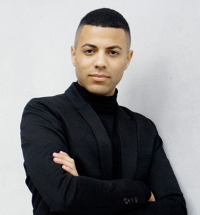 Composer Samy Moussa.
Composer Samy Moussa. The program, while adhering to the traditional (and unimaginative) overture-concerto-symphony formula began with something that was new and impressive.
As Nocturne unfolded, so did its harmonic language. The piece is tonal (in a broad sense of the word), and often its textures are bluntly chordal. But Moussa has found some exotically fascinating ways of putting his rich, thick chords together, and his masterful skills in orchestration contribute to the vividness of his harmonies. That said, I’ll also suggest that there’s something formally skewed in this piece: it has an extended opening, a substantial ending, but not much of a middle.
Stylistically speaking, there’s a yawning chasm between Moussa and Mozart. But Nagano and the MSO ably bridged it – with some help from the pianist Piotr Anderszewski. I was a little alarmed when I saw Nagano step before a very large orchestra for Mozart’s Piano Concerto No. 25. (I counted about two dozen violinists.) But my fears of over-grandness were soon allayed.
Indeed, in the first movement, a charming intimacy unfolded between the soloist and the conductor, with only a subtle push-and-pull between them. Balance was maintained in a state of pristine perfection, with the piano’s clear tone rising clearly but ever so gently above the orchestra.
This delicate poise extended through the whole concerto. The second movement was all delicacy and simplicity. And the third had a touch of martial crispness, propelling Anderszewski’s playful phrasing and glittery runs.
Sibelius’ Symphony No. 2 was a little slow out of the gate – with Nagano and the MSO giving a tentative reading of the first movement that sounded merely introductory in character.
Happily, the subsequent movements were more substantial. The second and third movements were impressive for the fluidity of Nagano’s conducting – and his players responded with precision to the bold accelerandos of the second and the agitations of the third.
In the finale, Nagano blended his orchestra into a richly layered and multi-hued wall of glorious sound. His build-up to the glorious climax felt powerful, inevitable and satisfying. It was the best orchestral playing I’ve heard in Roy Thomson Hall for some time.
As I left my seat, I noticed the Canadian Opera Company’s music director, Johannes Debus in the audience. Was Debus there to scout out Moussa as a possible composer for the COC? (Moussa has already written a couple of operas that have been well received in Europe.) It wouldn’t be a bad idea.
© Colin Eatock 2015
 RSS Feed
RSS Feed

